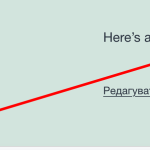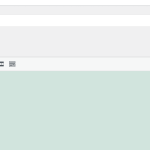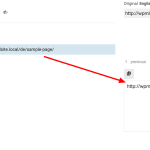This is the technical support forum for WPML - the multilingual WordPress plugin.
Everyone can read, but only WPML clients can post here. WPML team is replying on the forum 6 days per week, 22 hours per day.
Tagged: Documentation request
This topic contains 7 replies, has 2 voices.
Last updated by Andrey 1 year, 3 months ago.
Assisted by: Andrey.
| Author | Posts |
|---|---|
| July 29, 2024 at 1:12 pm #16016175 | |
|
edwinv-4 |
Background of the issue: Symptoms: Questions: |
| July 29, 2024 at 6:35 pm #16017622 | |
|
Andrey WPML Supporter since 06/2013 Languages: English (English ) Russian (Русский ) Timezone: Europe/Kyiv (GMT+02:00) |
Thank you for contacting WPML support. Depending on how you added your link to the page, you can try translating it in WPML's Advanced Translation Editor by adding your link to the translation using the language configuration file. https://wpml.org/documentation/support/language-configuration-files/ It could be that your link is already available for translation. Have a look here: https://wpml.org/announcements/2020/02/translating-links-with-advanced-translation-editor/
|
| July 30, 2024 at 12:27 pm #16020523 | |
|
edwinv-4 |
Hi Andrey, Thanks for your reply. We're using the normal WordPress editor, but when saving and updating the translations, it is overwritten. We would like to ignore this in the WP editor with somekind of class, ID or whatever. How would solve this? Thanks in advance. |
| July 30, 2024 at 3:20 pm #16021247 | |
|
Andrey WPML Supporter since 06/2013 Languages: English (English ) Russian (Русский ) Timezone: Europe/Kyiv (GMT+02:00) |
Thank you for your feedback. There isn't a straightforward solution for this question, and no settings or classes are able to handle it. WPML automatically translates links, which is typically what users expect. If you're using Gutenberg blocks to create content with links and the WPML translation editor to translate the page, you can attempt to find the specific Gutenberg block containing the link and change the type="link" to something else. This should prevent the link from being automatically converted. Here is an example of how it can appear <wpml-config>
<gutenberg-blocks>
<gutenberg-block type="core/some-block" translate="1">
<xpath type="link">//a/@href</xpath>
</gutenberg-block>
</gutenberg-blocks>
</wpml-config>
The links may not be converted if you are not using a WPML translation editor but a WordPress editor for translations. I can't promise 100% success, as this is something that is not expected with the current WPML features, but these ideas are worth trying. |
| August 2, 2024 at 1:29 pm #16033706 | |
|
edwinv-4 |
Hey Andrey, Thanks! I'm going to try that. Do you know if there is also a way to do this in the default WordPress editor instead of the Gutenberg editor? (old school) 😉 Thanks a lot! Finn |
| August 5, 2024 at 10:56 am #16039218 | |
|
Andrey WPML Supporter since 06/2013 Languages: English (English ) Russian (Русский ) Timezone: Europe/Kyiv (GMT+02:00) |
Hello Finn, Unfortunately, there is no such way for the classic WordPress editor. You can add different links only if you are using a classic WordPress editor for translations also instead of a WPML translation editor. |
| August 8, 2024 at 1:36 pm #16053037 | |
|
edwinv-4 |
Hi Andrey, Aha, okay. That is not so nice. Sometimes our client would like to link simply to other pages in other languages, but as I understand there is no other option. Thanks anyway for checking! |
| August 8, 2024 at 2:12 pm #16053230 | |
|
Andrey WPML Supporter since 06/2013 Languages: English (English ) Russian (Русский ) Timezone: Europe/Kyiv (GMT+02:00) |
Hello Finn, I do understand this. I performed additional tests using the Classic WordPress Editor after translating the link in the WPML Advanced Translation Editor. The link did not change even after running the "Translate Link Targets" option. |



